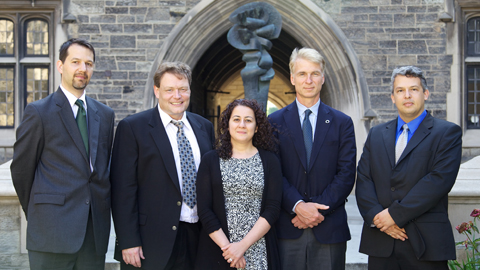
For generations now, people from around the world have accepted the invitation to fly the friendly skies. This has increased global travel and advanced cultural and commercial exchanges. However, it has also left an increasingly large carbon footprint, one that researchers at the University of Toronto Institute for Aerospace Studies (UTIAS) have been seeking to shrink.
The impacts of commercial aviation on the environment are substantial. The emissions created by burning jet fuel cause air pollution and, over decades, climate change. Currently, commercial aviation produces 4.9% of the total human contribution to global warming and that number is climbing. The International Air Transport Association (IATA) has targeted the stabilization of net CO2 emissions from the aviation industry by 2020, with a long-term goal to reduce net carbon emissions by 50% by 2050 compared to 2005 levels.
Now, thanks to a new Collaborative Research and Training Experience (CREATE) Program grant from the Natural Sciences & Engineering Research Council of Canada (NSERC), U of T Engineering professors can provide new training for the next generation of aerospace engineers. Today, NSERC announced $1.65-million in funding to establish the NSERC CREATE Program in Environmentally Sustainable Aviation. The grant will support students studying and conducting research in the field of sustainable aviation as well as establish a new certificate program. Over the six-year span of the grant, over 130 undergraduate and graduate students are expected to participate in the program.
“UTIAS has developed a strong international reputation for our research that reduces the aerospace industry’s carbon footprint,” explained UTIAS Director David Zingg. “This grant will allow us to capitalize on that expertise by offering new training to our students, which in turn will be taken into industry and put into practice.”
The program will train students to conduct research with world-class technical capabilities, develop their professional skills, and expose them to the highly interdisciplinary knowledge needed by sustainable aviation professionals. Students will learn about aerodynamics to reduce drag on airplanes, study lightweight options in aircraft construction, examine biofuel options and conduct life cycle assessments of aerospace technology. The result will be engineering graduates skilled in using the tools and techniques available to reduce carbon emissions.
“The NSERC CREATE Program in Environmentally Sustainable Aviation will prepare a new generation of engineers for the challenges associated with reducing the carbon-emissions of the aviation industry,” said U of T Engineering Dean Cristina Amon. “We congratulate UTIAS for receiving this research grant and thank NSERC for providing this important support.”
“Airline travel has made our lives better, but it has also contributed to the plight of our planet’s fragile environment,” said Professor Peter Lewis, U of T’s associate vice president (research). “This research and this important investment are addressing a real need in the quest to protect the planet’s environment while also enabling the airline industry to grow.”
The new program will also build upon the biennial International Workshop on Aviation and Climate Change, which is hosted and organized by UTIAS. The workshop brings together representatives from academia, government, and industry to find technological solutions to reduce the greenhouse gas emissions from aviation. The third annual conference was held May 2 to 4 and covered aircraft design, engine design, alternative fuels and atmospheric science.



